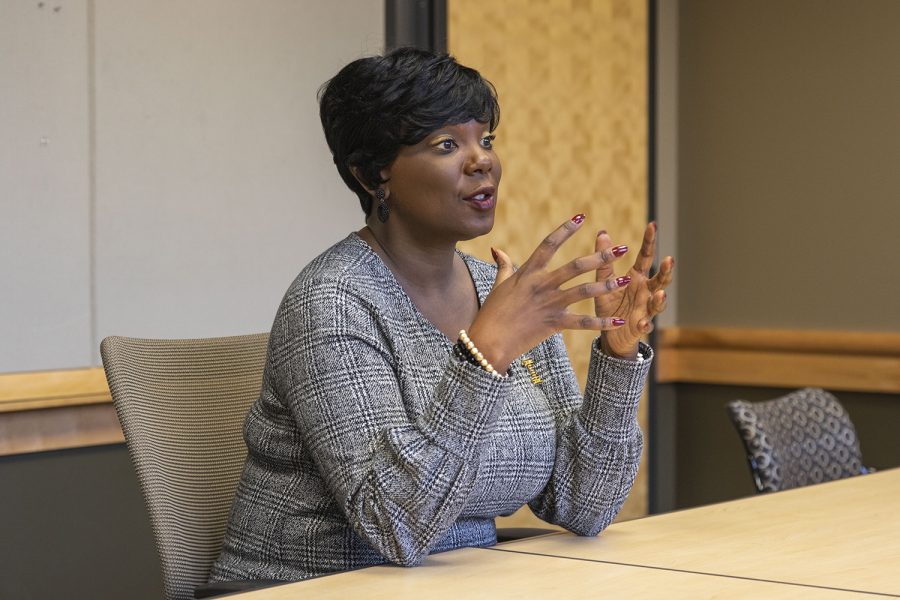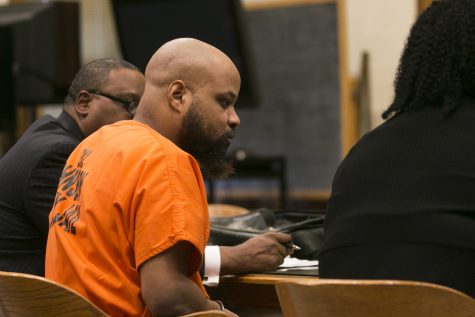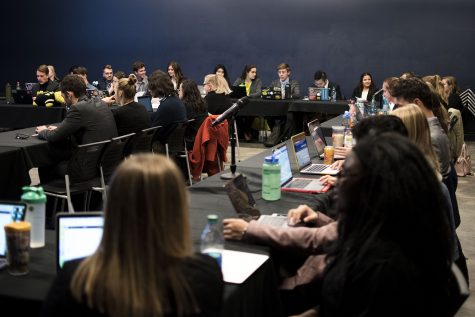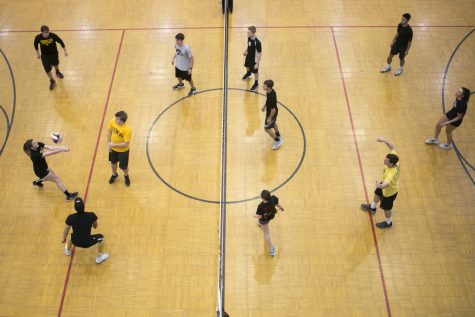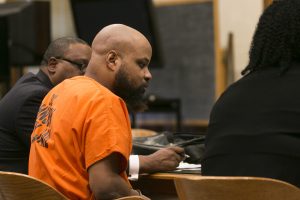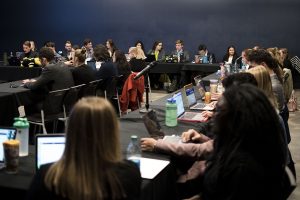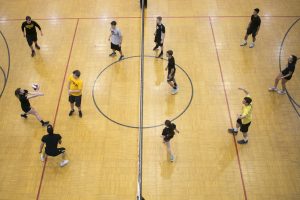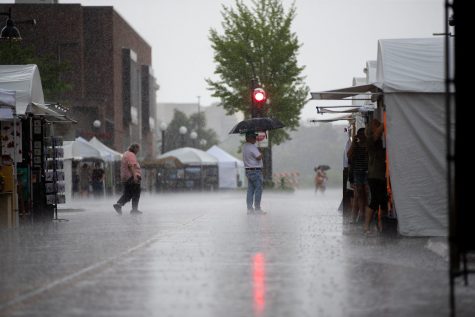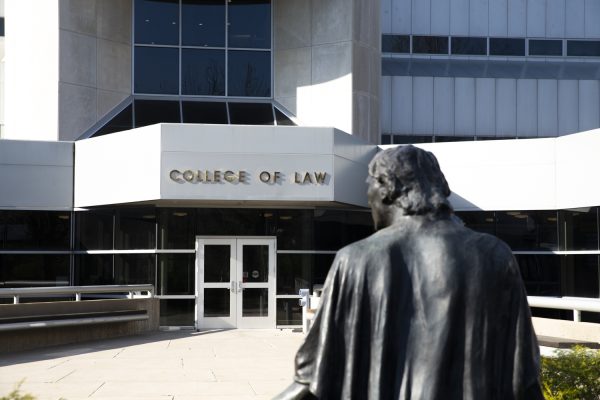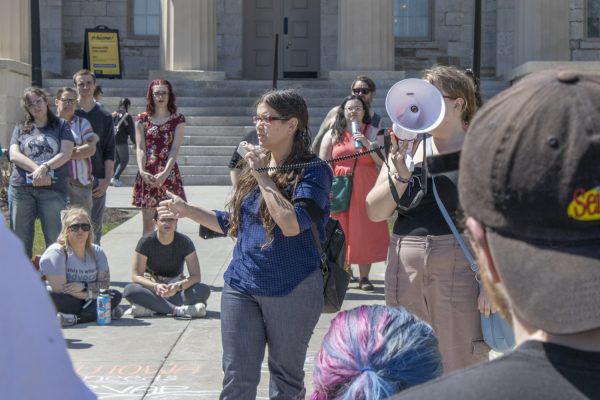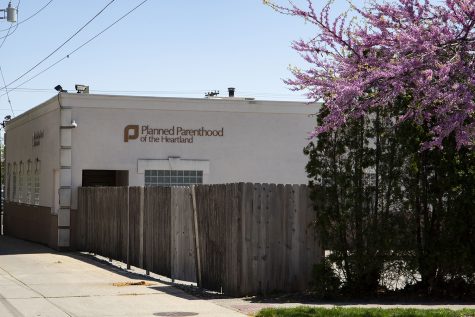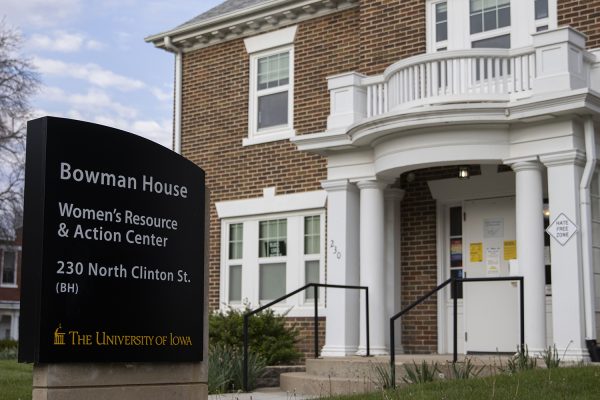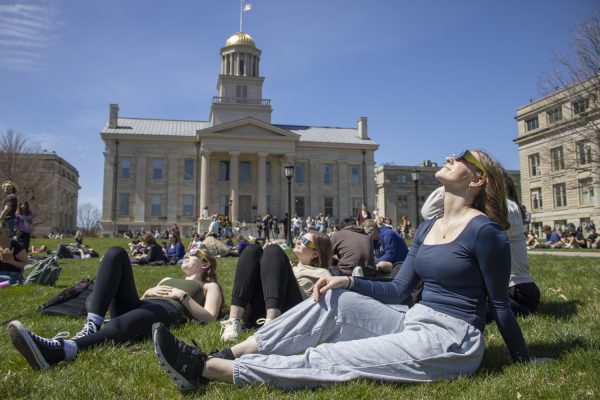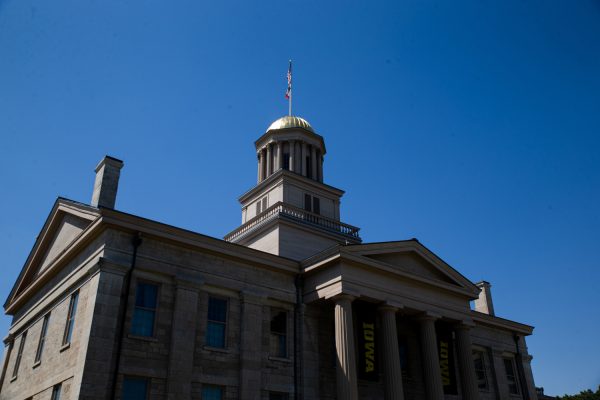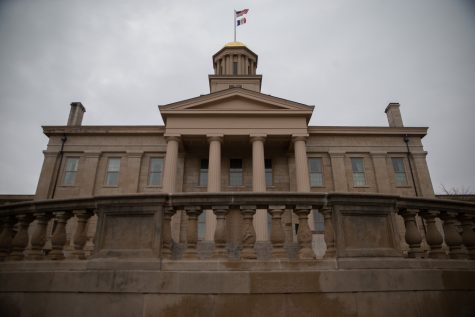Melissa Shivers discusses inclusivity, accessibility, and revising the greek life experience
In an interview with the DI, VP for Student Life Melissa Shivers spoke about creating more spaces for international students, accessibility for disabled students, and a new plan for greek life after suspensions.
UI VP for Student Life Melissa Shivers speaks in an interview with The Daily Iowan on Tuesday, Oct. 30, 2018.
November 5, 2018
DI: Ann said there’s something you wanted to start off with.
Shivers: Yeah. You know, it’s as a human, and certainly as an administrator on a college campus, you’re unable to really separate the things that are happening in the world from the things … that could directly affect what’s happening on campus. And quite candidly, it’s been a really challenging semester for us, not just at the University of Iowa, but I think just in the national community.
And I was struck by the piece that was included from the confidential resources on campus, the piece that they put in The Daily Iowan, the op-ed about supporting yourself, and reaching out to others, and using the services, and I think it’s important that we recognize that things are happening around the world, issues of hate, loss, threat, behavior that when I think about the values of the University of Iowa that are seemingly not aligned.
And it’s important for me that I remind our campus community that we are here to be a support. I see college campuses as a place where people should be able to come, and define, and sometimes redefine themselves, and center themselves on their values and beliefs, and that when they find that thing that speaks to them, that they also find ways to operationalize it. And it’s been heartwarming for me, since being at Iowa, to see the way that we galvanize around issues but also the ways that we reach out and support people who may feel like they are being negatively affected or not feeling safe or part of the community.
And so, for me, it’s also about acknowledging the fact that those things have happened in our world and that they directly affect us here at the University of Iowa, and that students and faculty and staff are feeling deeply right now. Particularly events over the past week have caused a great deal of unrest and uncertainty, and what I believe and know about the University of Iowa is that we will continue to deepen our commitment and our alignment to our values and that students faculty and staff who are here on our campus are welcomed and supported and valued.
I have the distinct pleasure of serving as vice president for Student Life, which also gives me the responsibility for ensuring the health and safety of our community. And I’m very lucky that here at Iowa there are tons of resources and a value systems that align with what my responsibilities are. So how do we make sure that we continue to share those values, operationalize those values, and reach out to people who may be hurting those who are a part of affected groups, and how do we show them support.
We all do that in different ways, but I think it’s important that we as a University of Iowa continue to do what we do best, which is love and care for and show compassion for everybody that has chosen this great institution.
And it’s been a tough semester, but that’s really sort of from my perspective what my role is. But also my values personally are very much aligned with who we are as a institution, and I feel very fortunate that I get to watch you all as students care for and connect and support one another in ways that I’m not sure you know are so very much appreciated. And you’re modeling the behaviors that I believe are imperative to a college and university community.
So I just want to make sure that I share that piece with you all but also to continue to solidify and make sure that individuals on campus know that they are values, appreciated, and supported even in times that it may feel scary and uncertain. Thank you.
If you don’t mind, can I jump right into, as a part of that, the fact that we are beginning today the search for the associate vice president and the dean of students, and I feel like that’s a way great way to sort of talk about it now is because so many of our campus community members are very interested in what the role of this person will be. And I had the opportunity just this morning to enjoy breakfast with the first candidate and being able to share with what type of community we have here at the University of Iowa and what sorts of support systems are in place for our students and also things that they can do to better support the campus community.
At the same time, we just launched the search for the new associate vice president and executive director for diversity, equity, and inclusion, so that will be a new leader on our campus to continue to further deepen our commitment to diversity, equity, and inclusion. And I look forward to seeing how those two positions are able to partner to really enhance the campus community. Yeah, so it’s all kind of connected. They understand our passion and commitment to safety and support and diversity, equity, and inclusion, so it’s an exciting time at the UI.
• • •
DI: So in reporting on the cultural centers, people working with them are hoping to identify better ways to support international students … I was wondering what are your thoughts on better ways to support them.
Shivers: Absolutely. When I arrived on campus, one of the first things that President Harreld told me was this dream of sort of a multicultural corridor, in which there are spaces that are aligned with our cultural and resource centers that also serves as a home for our international students and opportunities for all those communities to be able to connect and work together. And I’m excited about continuing those conversations around how do we try to create that space.
In that meantime, we have dedicated staff members to work directly with our international students, and a lot of the ways that [they] does that is that within the difference cultural centers on campus. So the international students have an opportunity to visit these cultural and resource centers that what I believe in many ways can become also their home, too.
So I think we have a very strong commitment to our international-student population, and how we continue to demonstrate that support is something that we want to make sure we continue to focus on. The flag display was a great representation of how we welcome our international students to the university, and I looked forward to seeing those hanging back across the bridge in May as well. Thank you.
• • •
DI: The Trump administration recently moved to propose guidelines narrowing the definition of gender, and the scope is still unclear at this point. But how is the UI hoping to show support for those students?
Shivers: Well, it’s been really interesting. I really valued and appreciated the work of the Trans Inclusivity Task Force, as well. I’ve been really appreciative of the ways that they have worked to help us to think through how do we make sure that we’re using inclusive language, but I think it’s important … to always remember that we will do the things that are certainly in alignment but are also aligned with our values at the University of Iowa.
And there certainly are concerns that have been shared with me about sort of this idea of any erasure of gender norms and what that means for our campus, but I continue to believe that we will be in alignment and certainly operating in congruence with our values and welcoming everyone to our campus and honoring their identities is really important.
• • •
DI: A student group is petitioning for the university to advocate for moving the Student Disability Services location to somewhere more accessible, and you responded to ask what the statement on that, but I was wondering if you wanted to expand on that here and see if there’s anything else the university is planning to do to support them.
Shivers: Thank you for asking and following up on that. When I arrived a little over a year ago, former UISG President Rachel Zuckerman shared with me some concerns that were — she really did a nice job of just sharing with me sort of a landscape of the institution, and one of the areas that she mentioned to me was the location of Student Disability Services but also just people not knowing where Student Disability Services was located.
So we started working a little bit on increasing and enhancing the signage of the space, while at the same time I was continuing to hear from students that there were a lot of concerns about its location, and quite frankly those are concerns that I also share. And because of that, I created two sort of work groups.
One work group is looking at the IMU and how do we make sure that we are programming that space so that is, again, continues to be in alignment with our focus on student development and community engagement. But at the same time, we need to look at sort of those University Counseling Service, Student Health & Wellness, and Student Disability Services, because my dream is try to have this co-located facility where all three of those units are a part of one space that would be in a centralized location on campus, one that would be visible, but more importantly, more accessible to students.
So those two work groups have been meeting since August of this year and will continue to meet throughout this semester, spring semester, and will be asked to provide recommendations for what that location might look like, what would it require for us to be able to co-locate specifically Student Disability Services, University Counseling Service, and Student Health & Wellness into one location. The challenge is, where’s it going to be? Is it going to be a new building? And we know that’s very challenging to do, and if it’s not going to be a new building, would it be a current existing space that we could repurpose for those three units?
So that is a conversation that has already started, and I’m really thankful that the students also connected and realized the importance of that space being accessible, and so now we are working and have been working very hard to work in that direction. Thank you for the question.
• • •
DI: On another topic, you know, what’s probably been part of your busy semester, nine fraternities were suspended. Drinking and drug use are higher among Fraternity/Sorority Life than general-student population according to that survey that was released in the spring. Where is the UI at in working on improving the quality of greek life, and what’s been the response from that Fraternity/Sorority Life community to administration, including yourself?
Shivers: Thank you for the question, and as I mentioned on the day that I had the unfortunate responsibility of communicating the interim suspensions for those fraternities that the University of Iowa deeply values what the fraternity and sorority experience can be on a college campus. But as I started out with you all in the very beginning, I talked about my role and responsibility as it relates to the health and safety of our community. And so, while certainly not a decision that everyone has been excited about, I also believe the health and safety of our students has to be my priority, and that includes our fraternities and sororities.
And so the intent behind learning more about the alleged violations, this interim suspension has provided us an opportunity to not only learn more about the violations. But in an interesting sort of way, it’s created an opportunity for us to open doors for communication with the fraternity and sorority system. And just yesterday, I dedicated 11 a.m. until 8 p.m. in Prairie Lights where I sat down with and invited all 23 fraternity presidents to visit with me so I could hear what they believe are some concerns about the culture at the University of Iowa as it relates to fraternities and sororities, where we were also able to talk a bit more about sort of the expectations that we have of them as a community and that, quite frankly, we have for all of our students.
But also my responsibility in focusing on the health, and safety, and wellness. And I must tell you, after when I left last night at a quarter until 8, because my last appointment was at 7, I felt encouraged, because I felt encouraged that they were able to hear my concerns, and I was able to hear some of their concerns. And what I think we left there with was the intent of having a more intentional and thoughtful partnership around issues as it relates to alcohol.
How do we engage in social activities that do not potentially create environments of harm? Those are things that we’re going to have to work on together. It’s not enough that we’ve fallen out of the party-school ranking. That’s something that certainly we are proud of, yet, there are still challenges that exist. But I am ready and willing to start to work with those individuals in that community to help make the Fraternity/Sorority Life experience better.
I shared with them and I shared with all of you, I’m a 22-year member of a sorority, and so that system means a great deal to me and certainly informed a lot about who I am as a leader, so I know the good that comes from fraternities and sororities. And I think we’re at a critical moment, juncture, in the fraternity-sorority world, as a whole across the country, where we have to make some really hard but definitive decisions about who we want to be, and we have to continue working on how to change that culture.
So the strategic plan, Fraternity/Sorority Life’s strategic plan 2020, is designed to help address in more strategic ways things that we can do to deal with social events and recruitment and how we onboard members into the fraternities and sororities and house-director roles and expansion of the fraternity and sorority system.
That, we hope, will help to serve as a road map for us, and I expect to get those recommendations in December 2018 to begin implementation in January 2019. And I look forward to sitting down with you all and talking a little bit about what those recommendations were and how we look forward to operationalizing them. Actually, I would really appreciate the opportunity to be able to do that, and perhaps have members of Fraternity/Sorority Life to join in that meeting, because they are helping to shape that plan. So, I feel better about where we’re going but look forward to working, really working, and moving forward together.
DI: And you said you invited 23 presidents, that’s just fraternities, right? Not sororities?
Shivers: Just fraternities. I’m meeting with the sorority presidents. I received an email invitation from the Panhellenic Sorority Erin Klage, who is the president of Panhellenic, met with me a couple of weeks ago, said we really want to talk about how do we partner and help to address these as well.
So we are now working on identifying a date for me to have dinner with all the Panhellenic presidents to have a very similar conversation. The reason that I focused on Interfraternity Council at this point, honestly … is because of the recent incidents, and also that I believed it was important for them to really get to hear from me one-to-one and for them to be able to share things that they believe would be helpful in a one-to-one setting that sometimes you don’t feel comfortable doing in a larger group setting, and I’m really glad we did.
DI: So you invited all 23, did all 23 meet with you?
Shivers: They did not.
DI: How many met with you?
Shivers: The numbers varied. I would probably say between 12 and 13 of the groups showed up.
DI: And then another question I had was just a follow-up, which is more of a culture question also.
Shivers: OK.
DI: Looking at those numbers, and I don’t have them with me at the moment, but I have them on my laptop, it seems kind of across the board with drug use and alcohol in greek life, fraternities, like males, are seeing those higher numbers than females in sororities. Do you think that has to kind of do with, you know, the culture of — I don’t know if I want to use the word “toxic masculinity” — but do you think that males have more of a tendency, or at least is that what we’re kind of seeing here at the UI and maybe across the nation, too, if I were to look at those other colleges’ numbers of like hazing being more of an issue, those pressures of drinking and drug use being more of an issue as you have that culture, maybe brotherhood?
Shivers: That’s an interesting thought, and I don’t want to speculate and suggest that that would be factual, but the NCAJ data that we have certainly indicate that in the Fraternity/Sorority Life community that we need to pay more attention to the cultures it relates to, to alcohol and drugs. I wonder what it would look like across the community and also nationally, so I don’t ever want to suggest that it’s only in those communities. But we certainly, as you mentioned, the NCAJ data does tell us a story that we need to be responsive to.
DI: Sure. Yeah, that’s all I have for now.



